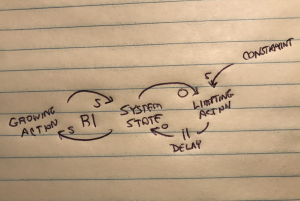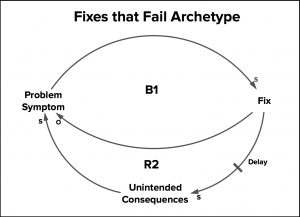There is second very distinct kind of “loss” that can create a primal resistance to organizational change efforts. Some individuals or groups may feel this loss as a “lack of choice”. Certainly in many organizations a new vision, desire for and plans for change may come from the leadership far above the average group or employee, but of course there are choices to make regarding “how” to direct those changes down into the organization effectively. One choice frequently made is to just tell people what they are going to do and one must anticipate that method to elicit this particular reaction of a sensing a “loss of choice” from many. So, truthfully, people resist the imposing of change more than just change.
J.W. Brehm (1966, Atlantic Press) described this phenomena in his work “A Theory of Psychological Reactance.” When an individual’s sense of freedom is threatened, the immediate reaction is likely going to be an attempt to regain this sense of freedom and choice. In fact, the reaction can be so strong that people may not even attempt to defend their beliefs and may even change their views to oppose this imposition of change and perceived loss of freedom.”
Have you ever wondered why some individuals seem to resist “any” change, even when it seems they change their views? It is likely that for those individuals this “removal of choice” factor is very high in terms of what provokes immediate resistance behaviors from them.
If we think of raising a child, telling a child to stop doing something is very different than the child deciding to not do something on their own. Of course, I understand for children when we truly need to say “stop” or “don’t do that”, for example, to keep them from imminent harm. However, those that have, or are, parenting recognize the value of leading children to good decisions on their own and “their choice” leads to more effective change. This reaction to change imposition or choosing change is shaped early and continues on
How many company surveys today (when done) are revealing comments from employees that say things like “too autocratic”, “not enough communication”, “no one asks us what we think”, “only management has good ideas apparently”, “too much managing down”, “my manager doesn’t include me in any decisions”? Ring a bell?
Whether managing or coaching one-on-one and desiring to see change or whether leading a large organizational development project, this “sense of loss” described in my first two blog posts (The Primal Resistance to Change Part I, and Part II) should shape your conversation, communications, and perhaps even choices in how to make the overall decisions on terms of what needs to change.
If you are tasks with leading organizational change, does it make your job harder? less convenient? generate more work? Yes, but truly recognizing this basic resistance and creatively and thoughtfully accounting for this in planning may prevent a seriously derailing of your project in the early stages.
To continue examining resistance, my next post will start examining the actual types of resistance you might be in behavior and actions as you work through organizational change. You will certainly recognize many common themes such as the “this too shall pass” mantra and others.

